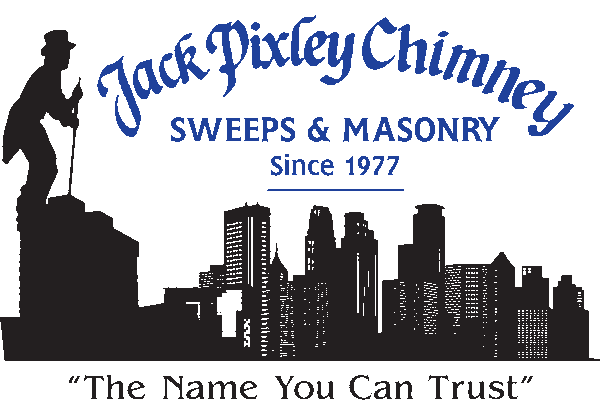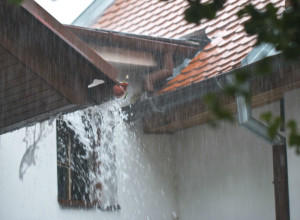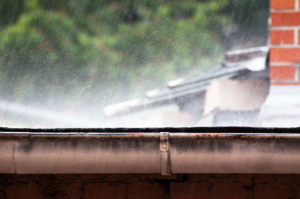Chimneys are built to last. Although masonry is one of the toughest building materials in the world, it can still deteriorate over time due to aging, damage, or overexposure to the elements. Luckily, there are pro-active ways that homeowners can protect their chimneys against damage.
Because water can be extremely damaging to masonry, it is important to protect your chimney against it. Waterproofing is one of the most effective preventative maintenance applications homeowners can have put on their chimneys. Having your chimney waterproofed can protect it against future water damage, as well as slow – or stop – the progression of current masonry deterioration.
What is waterproofing?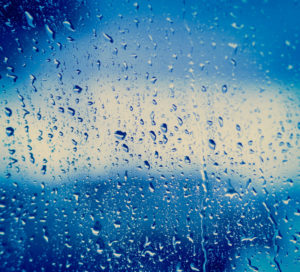
The waterproofing process for chimneys involves applying specially-designed water repellent to the bricks and mortar of the chimney. This creates a protective barrier that keeps water from being absorbed by the masonry, protecting the bricks against water damage.
Bricks are a naturally porous building material, making them ideally suited for chimney construction. While this porous nature allows gasses to pass through the bricks to the outside, it also can allow water in. If too much water is absorbed by the bricks it can cause them to crack, chip, or break away from the chimney structure; this affects not only the curb appeal but also the structural stability of your chimney.
Paint vs sealants vs repellents
Not all waterproofing products are created equally. Because of this, it is important to only use professional strength masonry water repellents. While the names are often used interchangeably, paint, sealants, and repellents are all very different products that can have different effects on your chimney.
– Paint: Regular house paint is not vapor permeable and is not meant to keep water out; by painting the masonry you are trapping water and gas inside the bricks. Trapped moisture will continue to deteriorate the masonry behind the paint, causing unseen damage. Paint over masonry that has bubbled or flaked is a sign that there is trapped water – and damaged masonry – underneath.
– Sealant: Sealants are often clear or slightly tinted and are designed to keep water from being absorbed. However, most sealants are not vapor permeable and therefore trap moisture inside the masonry just like paint.
– Repellents: Water repellents are the best products to use on masonry. A repellent forms a thin, vapor permeable barrier on the masonry that allows water and gas to evaporate while still preventing new moisture from being absorbed. This not only protects the masonry from new water damage, but can help stop existing deterioration. Repellents aren’t just for your masonry; they can also be used to waterproof your chimney crown.
Proactively caring for your chimney can minimize damage and extend its lifespan. By having your masonry waterproofed, you can help protect it for years to come against water damage from weather, humidity, sprinklers, and hoses. For more information on waterproofing your chimney, contact Jack Pixley Sweeps today!
When it comes to the weather, the old adage is true – April showers do bring May flowers! Unfortunately, spring showers can do more than just revitalize your garden after a long winter; they can also cause chimney damage. Water damage is often the primary cause of chimney deterioration. However, homeowners don’t have to sit idly by and watch the elements destroy their chimney. Instead, fight back against water damage by having your chimney waterproofed.
How water damages your chimney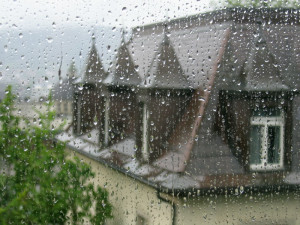
Although they are built to stand up to the elements, water is one of the most damaging forces to any chimney or masonry structure. Because bricks are naturally porous – which makes them the ideal building material for chimneys – they can absorb small amounts of water. Over time, this water can cause the masonry to crack, chip, or spall; this damage is often made worse by winter weather because of the freeze/thaw cycle.
The masonry damage caused by water entry is more than just an aesthetic problem. Damaged masonry can cause problems throughout your fireplace system, including chimney leaks. A chimney leak caused by cracked or spalled bricks can damage the surrounding masonry and building materials as well as other fireplace components. Dampness in the flue or firebox, water damage to roofs and walls surrounding the chimney, or cracked or missing bricks can all be signs of damaged masonry causing a chimney leak.
Protect your masonry through waterproofing
To protect your chimney from water damage caused by spring rains, consider having your masonry waterproofed. Waterproofing is preventative maintenance that can best protect your masonry against damage caused by water from rain, snow, ice, sprinklers, hoses, and other sources.
Our waterproofing products
When it comes to waterproofing your chimney, using the right products matters. In order to allow the masonry to retain its porous nature, special chimney-specific products should be used. At Jack Pixley Sweeps, we use and recommend three products by SaverSystems to our customers: ChimneySaver, CrownCoat, and FlashSeal.
- ChimneySaver: ChimneySaver is one of the longest-lasting water repellents available for chimneys. It can penetrate as deep as ¼ inch in most areas of the chimney, creating a strong bond with the masonry that will keep water out of years to come.
- CrownCoat: CrownCoat is a waterproof sealant designed for chimney crowns or washes. CrownCoat bonds with the cement of the chimney crown, protecting it from water entry and further damage to the concrete. CrownCoat also comes with a 15 year warranty against water intrustion.
- FlashSeal: FlashSeal is a rubber membrane that can be applied over your existing flashing to seal it against water entry. This is extremely important as faulty flashing is one of the main sources of chimney leaks. FlashSeal can reinforce existing flashing and is guaranteed to last up to seven years when correctly installed.
This year, don’t let spring rains damage your chimney; instead, protect your masonry by having it waterproofed. For those in the Minneapolis area, contact Jack Pixley Sweeps today for more information on our waterproofing services and to schedule your next appointment!

